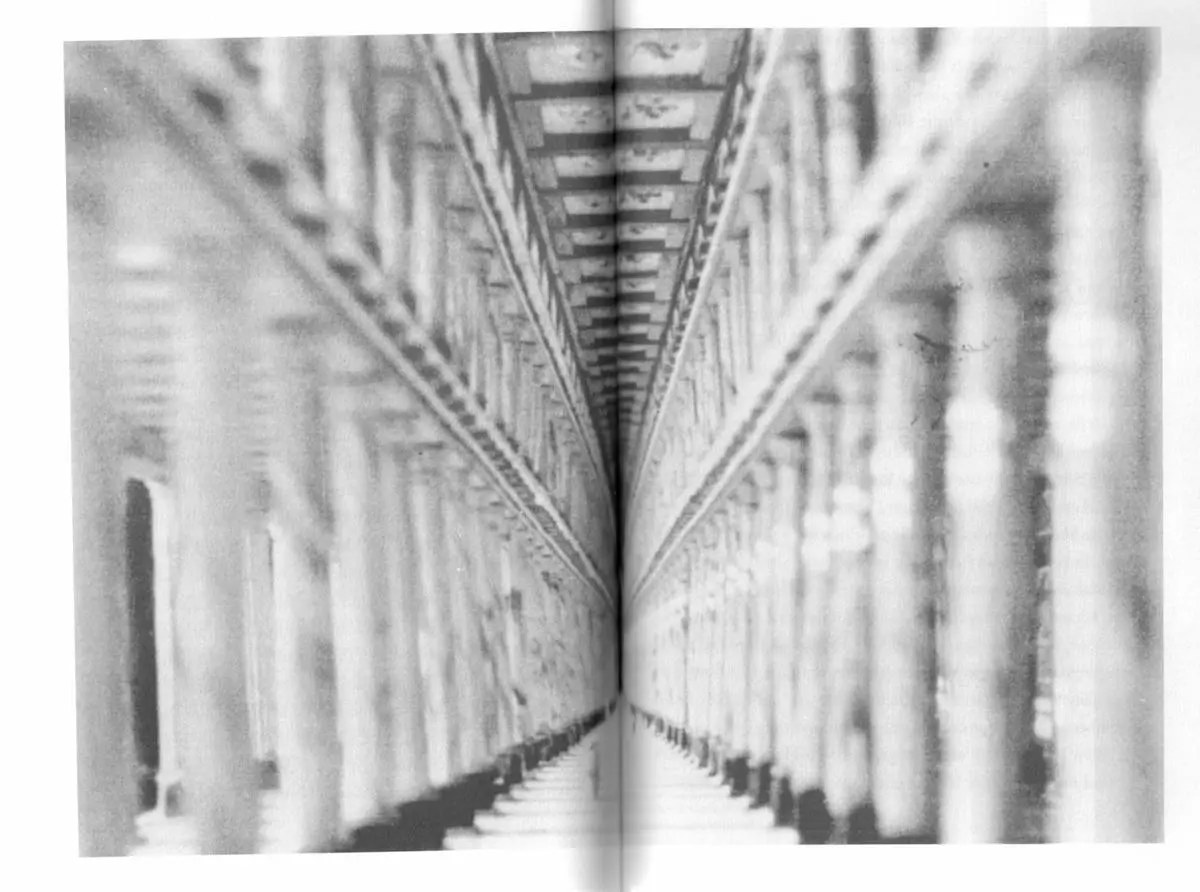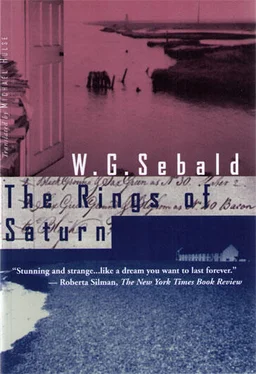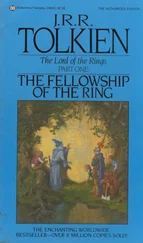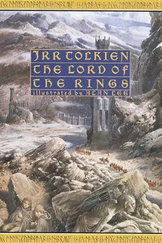
But on other days, when the evening light streams in through this window and I allow myself to be taken in by the overall view, then I see for a moment the Temple with its antechambers and the living quarters of the priesthood, the Roman garrison, the bath-houses, the market stalls, the sacrificial altars, covered walkways and the booths of the moneylenders, the great gateways and staircases, the forecourts and outer provinces and the mountains in the background, as if everything were already completed and as if I were gazing into eternity. In closing, Thomas Abrams dug out a magazine from under a pile of papers and showed me a double-page aerial view of the Temple precinct as it is today: white stones, dark cypresses, and in the centre, the golden Dome of the Rock, which immediately brought to mind the dome of the new Sizewell reactor, which can be seen on moonlit nights shining like a shrine far across the land and sea. The Temple, Thomas Abrams said as we left his workshop, endured for only a hundred years. Perhaps this one will last a little longer. On the bridge over the moat, where we lingered for a while, Thomas Abrams told me how much he liked the ducks, a couple of which were quietly paddling around in the water and snapping up the food which he now and then took out of the pocket of his overalls and threw down for them. I have always kept ducks, he said, even as a child, and the colours of their plumage, in particular the dark green and snow white, seemed to me the only possible answer to the questions that are on my mind. That is how it has been for as long as I can remember. As I took my leave and mentioned that I had walked over from Yoxford and was now going on to Harleston, Thomas said that he would drive me as he had an errand in town anyway. So we spent the quarter of an hour to Harleston sitting side by side in the cab of his truck, and I wished that the short drive through the country would never come to an end, that we could go on and on, all the way to Jerusalem. But instead I had to get out at the Saracen's Head in Harleston, an inn several centuries old whose guest rooms, as it transpired, were furnished with the most fearful pieces one can imagine. The headboard of the pink bed consisted of a black marbled formica construction nearly five feet high, with various drawers and compartments, rather like an altar; the thin-legged dressing-table was lavishly decorated with gold arabesques; and the mirror, which was fitted into the door of the wardrobe, made one look strangely deformed. As the wooden floorboards were very uneven and sloped towards the window, all the furniture stood at something of a tilt, so that I was pursued even while asleep by the feeling that the house was about to fall down. It was therefore with a certain relief that I left the Saracen's Head the following morning and walked eastward out of the town into the open fields. The stretch of land which I now traversed in a wide arc was no more densely populated than the one I journeyed through on the previous day. Every couple of miles there is a hamlet, and without exception these hamlets are named after the patron saints of their churches: St Mary and St Michael, St Peter, St James, St Andrew, St Lawrence, St John and St Cross, and as a result the people living there call the entire area The Saints. They say such things as: He bought land in The Saints, clouds are coming up over The Saints, that's somewhere out in The Saints and so on. My own feeling, as I walked over the featureless plain, was that I might well lose my bearings in The Saints, so often was I forced to change direction or strike out across country due to the labyrinthine system of footpaths and the many places where a right of way marked on the map had been ploughed up or was now overgrown. A couple of times I began to think I was lost, but then, around noon, I saw my goal, the round tower of the church of Ilketshall St Margaret, appear in the distance. Half an hour later I was sitting leaning against one of the gravestones in the cemetery of that parish, whose souls number no more today than in the Middle Ages. The eighteenth- and nineteenth-century parsons who were the incumbents of such remote livings usually dwelt with their families in the nearest small town and drove out into the country by pony cart just once or twice a week in order to hold services and make a few calls. One such vicar of Ilketshall St Margaret was the Reverend Ives, a mathematician and Hellenist of some standing, who lived with his wife and daughter in Bungay and was said to have liked his glass of sparkling Canary wine at dusk. During the summer of 1795 they were visited every day by a young French nobleman who had fled to England to escape the terrors of the Revolution. Ives talked with him about Homer's epics, Newton's mathematical theories, and the journeys which both of them had made in America. What great expanses that continent covered, and how immense the forests were, with trees whose trunks towered higher than the pillars of the tallest cathedrals! And the plunging waters of Niagara — what did their eternal thunder mean if there were not also someone standing at the edge of the cataract conscious of his forlornness in this world. Charlotte, the rector's fifteen-year-old daughter, would listen to these conversations with growing fascination, especially when their distinguished guest conjured up pictures in which warriors adorned with feathers appeared, and Indian maidens about whose dark skin there was a touch of moral pallor. Once she was so overcome with emotion that she ran out quickly into the garden on hearing of a hermit's good dog that led one such maiden, in her heart already a Christian, safely through the dangerous wilderness. When the teller of the tale later asked her what it was in his account that had so moved her, Charlotte answered that it was mainly the image of the dog carrying a lantern on a stick in his mouth, lighting the way through the night for the frightened Atala. It was always such little details rather than the lofty ideas that went straight to her heart. In the manner of such things, it was surely inevitable that the Viacomte, who was exiled from his homeland and undoubtedly surrounded by the aura of a romantic hero in Charlotte's eyes took on the rule of tutor and confidant as the weeks went by. Whilst it goes without saying that she practised her French, by taking dictation and engaging in conversation, Charlotte also asked her friend to devise more extensive courses of study for her, to include antiquity, the topography of the Holy Land, and Italian literature. They spent long hours in the afternoon together reading Tasso's Gerusalemme Liberata and the Vita Nuova , and in all likelihood there were times when the young girl's throat flushed scarlet and the Vicomte felt the thuds of his heartbeat right under his jabot. Their day always ended with a music lesson. When dusk was settling inside the house, but the light streaming in from the west still lit the garden, Charlotte would play some piece or other from her repertoire, and the Vicomte, appuyé au bout du piano, would listen to her in silence. He was aware that their studies brought them closer every day, and, convinced that he was not fit to pick up her glove, sought to conduct himself with the utmost restraint, but nonetheless remained irresistibly drawn to her. With some dismay, as he later wrote in his Mémoires d'outre-tombe , I could foresee the moment at which I would be obliged to leave. The farewell dinner was a sad occasion during which no one knew what to say, and when it was over, much to the astonishment of the Vicomte, it was not the father but the father who withdrew with Charlotte to the drawing room. Although he was on the point of departure, the mother — who, the Vicomte noticed, was herself most seductive in the unusual role which she was now playing in the teeth of convention — asked his hand in marriage for her daughter, whose heart, she said, was entirely his. You no longer have a native country, your property has been disposed of, your parents are no longer alive: what could possibly take you back to France? Stay here with us and be our adopted son and heir. The Vicomte, who could scarcely believe the generosity of this offer made to an impoverished emigrant, was thrown into the greatest conceivable inner turmoil by her proposal, which it seemed the Reverend Ives had approved. For while on the one hand, he wrote, he desired nothing so much as to be able to spend the rest of his life unknown to the world in the bosom of this solitary family, on the other hand the melodramatic moment had now come when he would have to disclose the fact that he was married. While the alliance he had entered into in France had been arranged by his sisters almost without consulting him and had remained a mere formality, this did not in the slightest alter the untenable situation in which he now found himself. Mme Ives had put her offer to him with her eyes half downcast, and when he responded with the despairing cry Arrêtez! Je suis marié! she fell into a swoon, and he was left with no other choice than to leave that hospitable house at once with the resolution never to return. Later, setting down his memories of that ill-omened day, he wondered how it would have been if he had undergone the transformation and led the life of a gentleman chasseur in that remote English county. It is probable that I should never have written a single word. In due course I should have even forgotten my own language. How great would France's loss have been, he asks, if I had vanished into thin air like that? And would it not, in the end, have been a better life? Is it not wrong to squander one's chance of happiness in order to indulge a talent? Will what I have written survive beyond the grave? Will there be anyone able to comprehend it in a world the very foundations of which are changed? — The Vicomte wrote these words in 1822. He was now the ambassador of the French king at the court of George IV. One morning, when he was sitting working in his study, his valet announced that a Lady Sutton had arrived in her carriage and wished to speak to him. When this strange caller crossed the threshold, accompanied by two boys aged about sixteen who, like herself, were in mourning, he had the impression that she found it difficult to remain upright owing to some inner agitation. The Vicomte took her by the hand and led her to an armchair. The two boys stood by her side. And the lady, speaking in a quiet, broken voice as she brushed back the black silk ribbons that hung from her bonnet, said: My lord, do you remember me? And I, the Vicomte wrote, recognised her. After twenty-seven years I was sitting at her side again, the tears swelled up in my eyes, and I saw her, through the veil of those tears, exactly as she had been during that summer which had long sunk into the shades of memory. Et vous, Madame, me reconnaissez-vous? I asked her. She did not reply, however, but looked at me with such a sad smile that I realized that we had meant far more to each other than I had admitted to myself at the time. — I am in mourning for my mother, she said; my father died years ago. As she said this, she withdrew her hand and covered her face. My children, she continued after some time, are the sons of Admiral Sutton, whom I married three years after you left us. You must excuse me now. I cannot say any more today. — She took my arm, the Vicomte writes in his memoirs, and as I led her through the house, down the stairs and back to her carriage, I held her hand against my heart and could feel that she was trembling. She drove off with her two dark-haired boys sitting opposite her like two mute servants. Quel bouleversement des destinées! Over the next few days, the Vicomte writes, I visited Lady Sutton four times at the address in Kensington that she had given me. On none of these occasions were her sons at home. We talked and were silent, and with each Do you remember? our past life rose more clearly from the cruel abyss of time. On my fourth visit, Charlotte asked me to put in a good word with george Canning, who had just been made Governor-General of India, for the elder of her two sons, who planned to go to Bombay. It was solely on account of this request, she said, that she had come to london, and she must now return to Bungay. Farewell! I shall never see you again! Farewell! — After this painful parting I spent long hours shut away in my study at the embassy and, with repeated interruptions for vain reflection and brooding, committed our unhappy story to paper. As I did so, I was troubled by the question of whether in the writing I should not once again betray and lose Charlotte Ives, and this time for ever. But the fact is that writing is the only way in which I am able to cope with the memories which overwhelm me so frequently and so unexpectedly. If they remained locked away, they would become heavier and heavier as time went on, so that in the end I would succumb under their mounting weight. Memories lie slumbering within us for months and years, quietly proliferating, until they are woken by some trifle and in some strange way blind us to life. How often this has caused me to feel that my memories, and the labours expended in writing them down are all part of the same humiliating and, at bottom, contemptible business! And yet, what would we be without memory? We would not be capable of ordering even the simplest thoughts, the most sensitive heart would lose the ability to show affection, our existence would be a mere never-ending chain of meaningless moments, and there would not be the faintest trace of a past. How wretched this life of ours is! — so full of false conceits, so futile, that it is little more than the shadow of the chimeras loosed by memory. My sense of estrangement is becoming more and more dreadful. When I walked in Hyde Park yesterday, I felt unspeakably wretched and outcast amongst the colourful crowd. As if from afar, I watched the beautiful young English women with the same bewilderment of my senses that I used to feel in an embrace. And today I do not raise my eyes from my work. I have become almost invisible, to some extent like a dead man. Perhaps that is why it appears to me that this world which I have very nearly left behind is shrouded in some peculiar mystery.
Читать дальше













